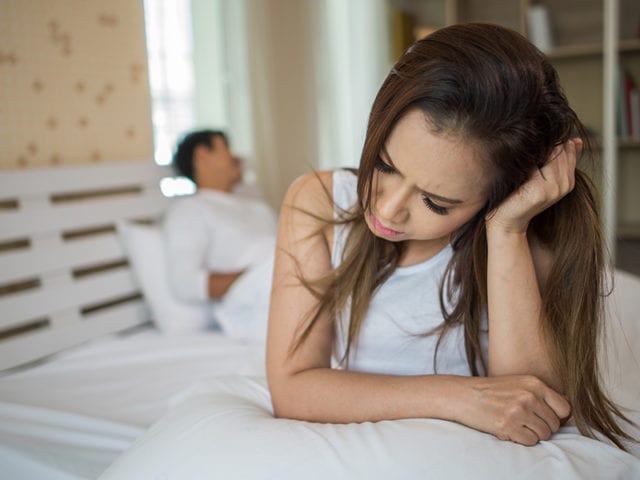Change in lifestyle, hormonal imbalances and physical and psychological factors can all affect your sex life. Sexuality is fluid in terms of attraction, desire, libido, gender, interest, boundaries, fantasies, and more. It changes over the course of a lifetime and fluctuates according to life circumstances and relationships. And it doesn’t mean it has to be unexciting and dull once you reach a certain age. You may need to put in a little more work, but romance and desire can be a consistent part of your life, no matter the age.
To better understand how to keep the spark alive in your 40s and beyond, TC46 connected with Psychiatrist and Sexologist Dr Sanjay Kumavat of Fortis Hospital in Mumbai. He talks about some common issues couples have in their 40s, the effect of menopause on libido, and how to explore your sexuality safely.
1. What are the signs of a stale relationship?
The signs for a stale relationship are as follows:
- When a person is not as physically intimate as he or she used to be in routine life
- Absence of touch
- Absence of warmth in the smile or the hug
- Scarcity of kindness to each other
- Lack of appreciation, gratitude, joy, enjoyment in bonding
2. What are the common issues faced by a couple in their bedroom in their 40s?
Men and women both develop hormonal changes. This may cause changes in desire, sexual arousal, and physical comfort during sexual activity. In their 40s, a couple generally might require a gentle nudge in getting aroused. Attitude towards physical relationship and intimacy should be like a traditional gourmet meal rather than fast food.
3. What are some major causes of these sexual health issues?
Sexual health is an important aspect of the overall well being of both men and women. Substance abuse disorders in one of the spouse and physical illnesses are the major factors causing sexual health issues. Other factors are:
- Taking partners feelings for granted
- A kind of monotonous relationship and need for novelty
- Lack of privacy because of children around
- Any kind of misunderstanding in the couple
- Lack of awareness, stigma associated with discussing the issues either with spouse or doctor that deprives opportunities for treatment
4. How does perimenopause affect your sex drive and libido?
Generally, it is associated with a lot of physical, emotional and mental problems. Disturbance in the level of the hormones oestrogen, testosterone is the cause of it. Perimenopausal women are not as easily aroused, and they may be less sensitive to touching and stroking. All the factors can lead to less interest in sex. Most women are unaware of the problems they are facing or the bodily changes within them. They may also suffer from sleep disorders, weight gain, fatigue headaches, night flushes and more.
Educate the patients about the condition well. Evaluate individual patients for their physical issues, medical treatment like iron supplements, Hormone Replacement Therapy, calcium supplements and or invasive surgical treatment can be suggested. Anti-anxiety and antidepressants along with counselling also help in recovery. Overall lifestyle management-healthy diet, exercise, yoga, meditation helps in walking over the period of perimenopause.
5. What are some ways to reignite one’s sex life in your 40s and beyond?
Accept the changes happening in your body and love your body unconditionally. Make sure that you explore with your partner all means and ways, and don’t feel awkward to talk about your wishes in sexperimentation or choices.
Choose comfortably the desired position that doesn’t strain you. Engage in behaviour that stimulates ‘feel good’ hormones by hugging, caressing, or touching. Boost your mood by closeness, kissing and so on. Reassure your partner that you still like him or her. Discuss openly the sexual dysfunctions and fix it with proper counselling and therapy.
6. How can you introduce sex toys in the bedroom in a safe manner? Which ones are best suited for couples in their 40s?
Awareness about the existence of such devices and removing stigma about its use are the first steps to use sex toys. Open a discussion or share a video of its actual use and benefits in a sexual act. In fact, the introduction of a gadget removes the performance anxiety, which is a common challenge sexually in an older couple.
Before using the product, a bit of research is advisable, as sometimes some toxic materials may be harmful. A dildo, vibrator, penis rings and massager are some common products. The Lovehoney glass dildo is good for G spot stimulation.
7. What are some tips for exploring one’s sexuality later in life?
Figure out what suits you the best among all sexual practices. Try to be innovative in practice. Be real and get out of the traditional taboos, cultural roadblocks and be open about your likes and dislikes. Try and gain information but from legitimate and relevant sources. One may join a workshop to learn a few more things and express your own concerns. Processing and discussing books and videos together can help you expand your concepts you may have missed, give input on circumstances you don’t understand fully. Last but not the least, it’s always a variety of cuisines in a dish that attracts a person to the dish.
8. When should you visit a sexologist?
Let us face it, most of us benefit immensely on giving sexuality some support. Do not shy away from problems. Many people deal with some combination of shame, fear and or unhealthy expectations around spending some time talking to a sexologist or social worker about sexuality and past sexual experiences. This may allow you to process, learn, evolve and overcome roadblocks that are preventing to enjoy sex fully, engaging in relationships or developing your self-esteem. It’s not a ‘sign of defeat ‘but a positive commitment to yourself.



